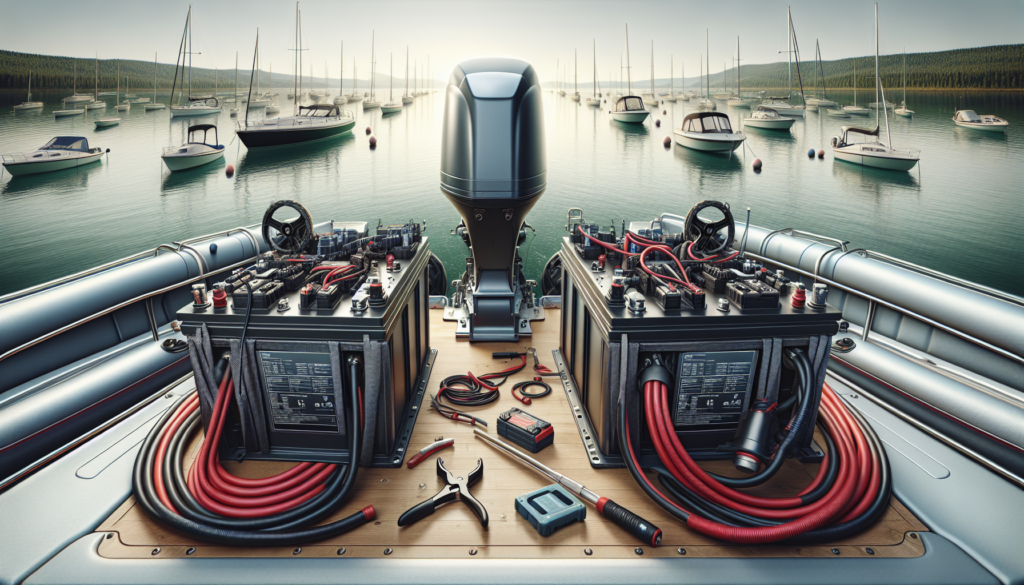Exploring the Power of Marine Batteries
Marine batteries play a vital role in powering boats, yachts, and other water vessels, providing the energy needed for navigation, communication, lighting, and various onboard systems. From leisure boating to commercial shipping, these batteries are essential components that ensure a smooth and efficient operation on the water. In this comprehensive guide, we will delve into the world of marine batteries, exploring their types, applications, maintenance, and the latest advancements in the field.
The Evolution of Marine Batteries
Marine batteries have come a long way since their inception, evolving from simple lead-acid batteries to more advanced technologies that offer improved performance and durability. Lead-acid batteries, which are still widely used in many marine applications, are known for their reliability and cost-effectiveness. However, newer technologies such as lithium-ion batteries are gaining popularity due to their higher energy density, faster charging times, and longer lifespan.
One of the key factors driving the evolution of marine batteries is the increasing demand for more efficient and environmentally friendly power sources. As concerns about climate change and pollution grow, boat owners and manufacturers are looking for alternatives to traditional fossil fuel engines, with electric propulsion systems powered by advanced batteries emerging as a promising solution.
Types of Marine Batteries
There are several types of marine batteries available on the market, each designed for specific applications and operating conditions. The most common types include:
1. Lead-Acid Batteries:
Lead-acid batteries are the traditional choice for marine applications, known for their reliability and affordability. These batteries are available in two main variants: flooded lead-acid batteries, which require regular maintenance and topping up with distilled water, and sealed lead-acid batteries, which are maintenance-free and can be installed in any orientation.
2. AGM (Absorbent Glass Mat) Batteries:
AGM batteries are a type of sealed lead-acid battery that uses a fiberglass mat to absorb the electrolyte, providing better resistance to vibration and shock. These batteries are maintenance-free, spill-proof, and have a longer cycle life compared to traditional flooded lead-acid batteries.
3. Gel Batteries:
Gel batteries are another type of sealed lead-acid battery that uses a gel electrolyte instead of a liquid. These batteries are designed to be maintenance-free, vibration-resistant, and capable of deep discharges without affecting their performance. Gel batteries are ideal for marine applications where space is limited and vibration is a concern.
4. Lithium-Ion Batteries:
Lithium-ion batteries are the latest innovation in marine battery technology, offering higher energy density, faster charging times, and longer lifespan compared to traditional lead-acid batteries. These batteries are lightweight, compact, and environmentally friendly, making them ideal for powering electric propulsion systems on boats and yachts.
Applications of Marine Batteries
Marine batteries are used in a wide range of applications, powering various onboard systems and equipment. Some of the common applications include:
1. Engine Starting:
Marine batteries are essential for starting the engine of a boat or yacht, providing the initial burst of power required to crank the engine and get it running. Engine starting batteries are designed to deliver high cranking amps to start the engine quickly and reliably.
2. House Power:
House batteries are used to power the onboard systems and equipment on a boat, such as lights, electronics, appliances, and pumps. These batteries are designed to provide a steady source of power over an extended period, ensuring that all essential systems are operational while out at sea.
3. Emergency Backup:
Marine batteries also serve as emergency backup power sources, providing a reliable source of power in case of a primary battery failure or electrical system malfunction. Emergency backup batteries are often kept charged and ready to use in case of an emergency.
4. Electric Propulsion:
With the rise of electric propulsion systems in the marine industry, marine batteries are increasingly being used to power electric motors on boats and yachts. Electric propulsion systems offer a quieter, cleaner, and more efficient alternative to traditional diesel engines, reducing emissions and fuel consumption.
Maintenance and Care of Marine Batteries
Proper maintenance and care are essential to ensure the longevity and performance of marine batteries. Here are some tips for maintaining and caring for your marine batteries:
1. Regular Inspection:
Inspect your marine batteries regularly for signs of damage, corrosion, or leaks. Check the terminals and connections for tightness and cleanliness, and clean them with a wire brush or terminal cleaner if necessary.
2. Charging:
Proper charging is crucial to the performance and lifespan of marine batteries. Avoid overcharging or undercharging the batteries, as this can lead to reduced capacity and premature failure. Use a quality marine battery charger that is designed for the specific type of battery you have.
3. Watering (for Flooded Batteries):
If you have flooded lead-acid batteries, check the water level regularly and top up with distilled water as needed. Make sure not to overfill the cells, as this can cause electrolyte overflow and damage the battery.
4. Equalization (for Flooded Batteries):
Equalization is a process that helps maintain the balance of charge in the cells of flooded lead-acid batteries. Follow the manufacturer’s guidelines for equalizing your batteries, and use a proper charging system that supports this function.
5. Storage:
If you are storing your boat or yacht for an extended period, it is important to properly store and maintain the batteries. Disconnect the batteries from the electrical system, fully charge them, and store them in a cool, dry place away from direct sunlight and extreme temperatures.
The Future of Marine Batteries
As technology continues to advance and environmental concerns become more pressing, the future of marine batteries looks promising. Manufacturers are investing in research and development to create more efficient, sustainable, and cost-effective battery solutions for the marine industry. From improved energy density to faster charging times, the latest advancements in battery technology are revolutionizing the way boats and yachts are powered.
Electric propulsion systems powered by advanced marine batteries are becoming increasingly popular, offering a cleaner and more sustainable alternative to traditional diesel engines. These systems not only reduce emissions and fuel consumption but also provide a quieter and more enjoyable boating experience for owners and passengers.
With the growing demand for electric and hybrid boats, marine batteries are set to play a crucial role in the transition towards a more environmentally friendly maritime industry. By investing in innovative battery technologies and sustainable power solutions, the marine industry can reduce its carbon footprint and contribute to a cleaner and healthier marine environment.
Conclusion
To wrap things up, marine batteries are essential components that power boats, yachts, and other water vessels, providing the energy needed for navigation, communication, lighting, and various onboard systems. From traditional lead-acid batteries to advanced lithium-ion technologies, there are a wide variety of options available to suit different marine applications and operating conditions.
Proper maintenance and care are crucial to ensure the longevity and performance of marine batteries, with regular inspection, charging, and storage practices helping to maximize their lifespan. With the rise of electric propulsion systems and the increasing demand for cleaner and more sustainable power sources, the future of marine batteries looks bright, with continued advancements in technology driving innovation and growth in the industry.
Whether you’re a boat owner, a yacht enthusiast, or simply curious about the world of marine batteries, exploring the power and potential of these essential components can provide valuable insights into the future of boating and maritime transport. As we look towards a cleaner and more sustainable marine industry, marine batteries will continue to play a vital role in powering the vessels of tomorrow.



